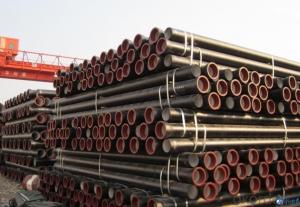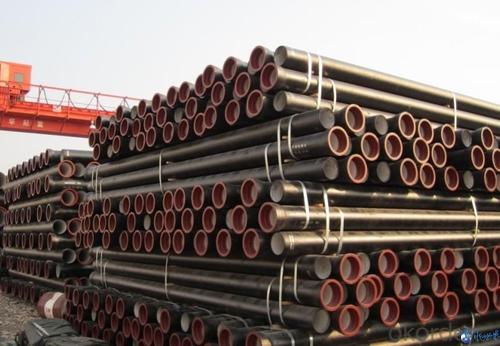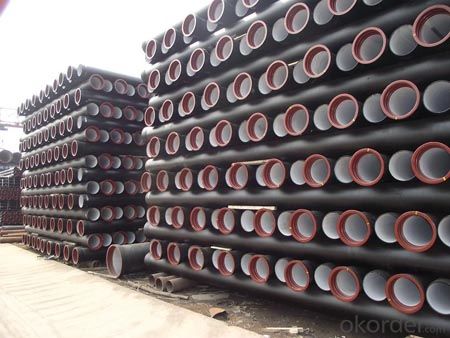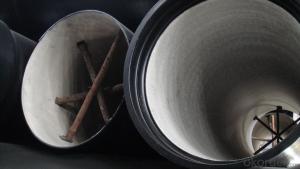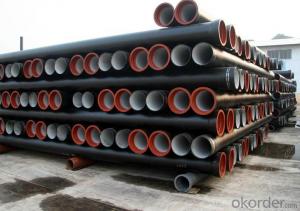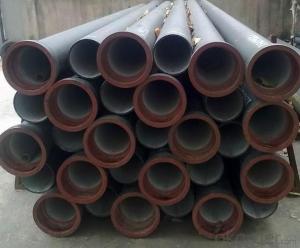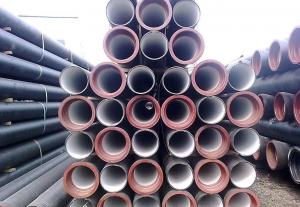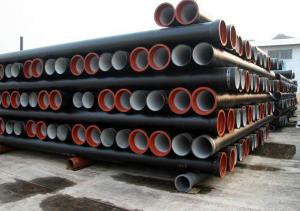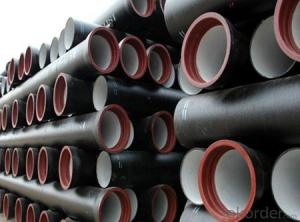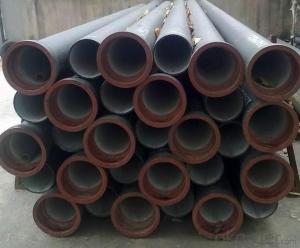Ductile Iron Pipe Cast Iron EN545 DN800
- Loading Port:
- China main port
- Payment Terms:
- TT OR LC
- Min Order Qty:
- 999 m
- Supply Capability:
- 9999 m/month
OKorder Service Pledge
OKorder Financial Service
You Might Also Like
1,Ductile Iron Pipe Description :
1) Pipes confirm to ISO2531,K9 class,T type joint,6m long,with inside cements lining conform to ISO4179, outside Zinc spraying(130g/m2) and bitumen coating(70μm) conform to ISO8179.
2) Pipe ends: Spigot and socket ends, with 100% SBR rubber gaskets accoding to ISO4633
3) we can do third party inspection according to customer's request.
4) Our products have been sold to many international market, such as Middle East and South East Asia and Africa.
2,Main Features of the Ductile Iron Pipe:
1. Material: Ductile iron grade 500-7/ 450-10 in accordance with ISO1083
2. Standard: ISO 2531, EN545, EN598, ANSI, AWWA
3. Certificate: ISO9001, ISO14001, SGS, NSF, WRAS
4. Test: In accordance with ISO 2531 / EN 545 / EN598 and 100% water pressure test
5. Length: 6m or cut into 5.6m, 5.7m, 5.8m
6. Internal Lining: Cement, conform to ISO4179
7. External coating: Zinc + Bitumen, conform to ISO8179
8. Rubber: NBR, SBR, EPDM according to ISO4633 / EN681.1
3,Ductile Iron Pipe Images:
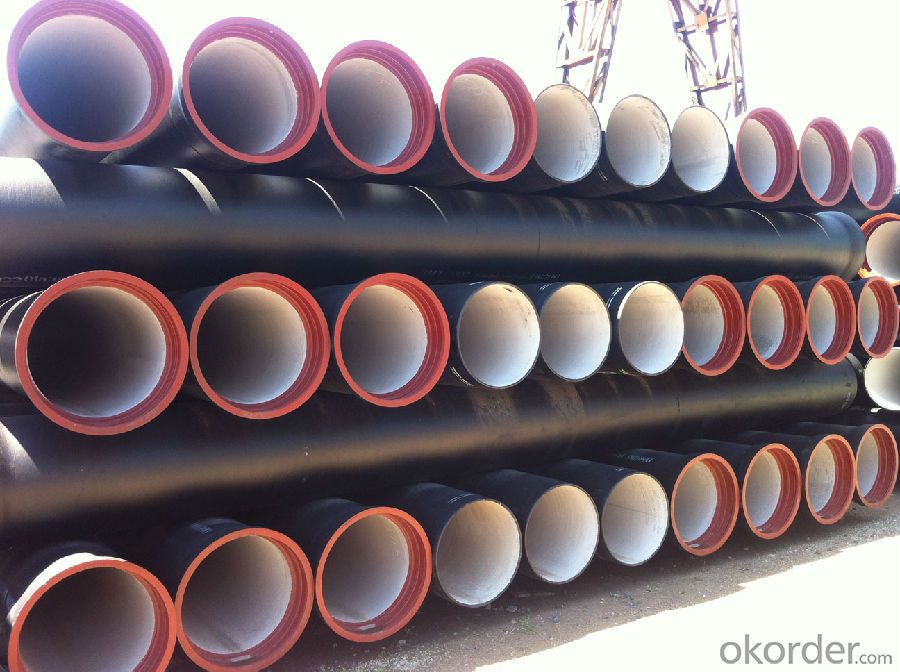
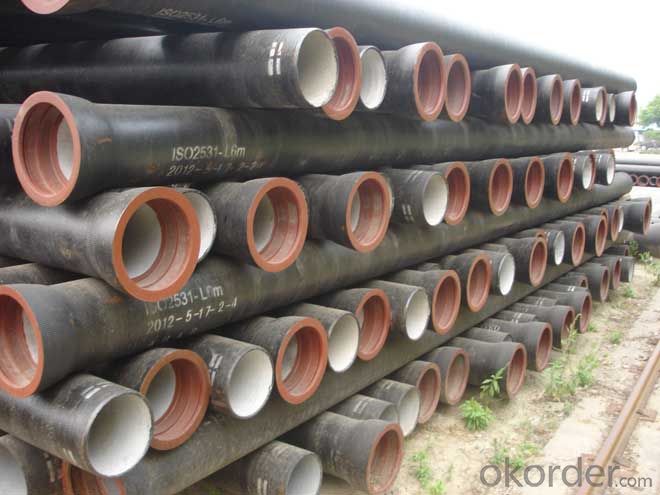
4. Ductile Iron Pipe Specification
Standard: API SPEC 5L 44th eidtion,ASTM A252-98(2007)
Grade: A53 Grades A/B, ASTM A106 Grades B/C,ASTM A179
AWWA, C200, ASTM A139, ASTM A120, API 5L Grade B
X42, X52, X56, X60, X65, X70, X80, X100
Weld Alternatives: LSAW
OD size range: 6.4~44.5mm
Wall thickness: 406.4~1422mm
Length: 3 - 12 m according to requirment
Note: Other grade can also be provided after consulting. Special design are available
for coal slurry conveyance LSAW line tube -- Service
Documentary MTC, material certification,Origin certification, CI or PI,Test Report, export licence, handling order, B/L,insurance policy,shipping instructions, contract, packing list etc.
5.FAQ:
We have organized several common questions for our clients,may help you sincerely:
1.Q: Why would you choose ductile iron pipe rather than other pipe materials?
A:The reasons are obvious for that not only ductile iron pipe possesses the inherent strength and flexibility of ductile iron, combined with proven corrosion protection systems, but also the cost savings can be achieved from design to installation and commissioning.
2.Q:Why can you guarantee the inner of pipes can’t be corroded?
A: High alumina cement mortar lining and sulphate-resistant cement mortar lining. These two special linings are applicable to inner anti-corrosion for sewage pipes, improving resistance to erosion of the sewage components.
- Q: Do ductile iron pipes require internal lining for potable water applications?
- Yes, ductile iron pipes do require internal lining for potable water applications. This is because the iron used in these pipes can react with the water and potentially contaminate it. Internal lining acts as a barrier between the water and the iron, preventing any chemical reactions and ensuring the water remains safe for consumption.
- Q: Are ductile iron pipes resistant to acid mine drainage corrosion?
- Yes, ductile iron pipes are generally resistant to acid mine drainage (AMD) corrosion. Ductile iron is a highly durable material that has been widely used in various industries, including mining and water distribution, due to its excellent corrosion resistance properties. Acid mine drainage is a significant environmental problem that occurs when water comes into contact with sulfide minerals in mining areas, resulting in the formation of sulfuric acid. This acid can corrode and deteriorate various materials, including pipes, leading to infrastructure damage and water contamination. Ductile iron pipes have a protective layer formed by a cementitious lining, typically made of cement mortar or an epoxy coating. This lining acts as a barrier between the corrosive AMD and the pipe material, preventing direct contact and reducing the likelihood of corrosion. Furthermore, ductile iron pipes have a high resistance to both internal and external corrosion, making them well-suited for environments where acid mine drainage may be present. They have proven to be highly reliable and long-lasting even in harsh conditions, ensuring the continued integrity of the water distribution system and minimizing the potential for leaks or failures. However, it is important to note that the resistance of ductile iron pipes to acid mine drainage corrosion can also depend on several other factors, such as the specific composition and concentration of the AMD, the duration of exposure, and the temperature. Therefore, it is recommended to consult with experts and conduct proper material testing and analysis to ensure the suitability of ductile iron pipes in specific AMD environments.
- Q: Are ductile iron pipes suitable for use in desalination plants?
- Desalination plants necessitate a dependable and long-lasting piping system to convey treated water to various destinations. Ductile iron pipes, famed for their strength, flexibility, and corrosion resistance, are truly an ideal choice for such plants. These pipes, crafted from a variant of cast iron fortified with magnesium, possess a heightened tensile strength that allows them to endure the pressures linked to the desalination process. Additionally, desalination plants often employ chemicals and other treatment methods to eliminate impurities from the water. Ductile iron pipes exhibit remarkable resistance to corrosion caused by these chemicals and can endure the harsh conditions present in desalination plants without deteriorating over time. This ensures the longevity and dependability of the piping system, consequently minimizing the chances of leaks or failures. Moreover, ductile iron pipes feature a sleek inner surface, which aids in diminishing friction and pressure loss during water flow. This aspect carries significant importance in desalination plants, where efficiency is paramount for the overall functioning of the facility. The smoothness of ductile iron pipes facilitates efficient water flow, thereby reducing energy consumption and optimizing the desalination process. In conclusion, ductile iron pipes are an appropriate choice for utilization in desalination plants due to their strength, flexibility, corrosion resistance, and smooth inner surface. These pipes provide a reliable and durable piping system capable of withstanding the elevated pressures, harsh chemicals, and demanding conditions prevalent in desalination plants.
- Q: Can ductile iron pipes be used for irrigation systems?
- Yes, ductile iron pipes can be used for irrigation systems. Ductile iron pipes have excellent strength and durability, making them suitable for a variety of applications, including irrigation. These pipes are resistant to corrosion and have a long lifespan, ensuring that they can withstand the harsh conditions often associated with irrigation systems. Additionally, ductile iron pipes have a smooth interior surface, which allows for efficient water flow and reduced friction loss. This makes them ideal for transporting water over long distances, ensuring proper irrigation of crops or landscapes. Overall, ductile iron pipes are a reliable and cost-effective choice for irrigation systems.
- Q: What are the different coating thickness options for ductile iron pipe?
- The coating thickness options for ductile iron pipe can vary depending on the specific application and requirements. Generally, there are three common coating thickness options for ductile iron pipe: 1. Standard Thickness: The standard coating thickness for ductile iron pipe is usually between 200 and 250 microns (8-10 mils). This thickness provides adequate protection against corrosion and abrasion in most soil and water environments. 2. Increased Thickness: In some cases, where the pipe is exposed to more aggressive environments or requires a longer service life, an increased coating thickness may be necessary. This can range from 300 to 500 microns (12-20 mils) or even more, depending on the specific requirements. 3. Specialized Coatings: For particularly demanding applications, specialized coatings may be used. These coatings can provide even higher levels of protection against corrosion, abrasion, or chemical exposure. The thickness of these specialized coatings can vary significantly depending on the specific coating material and application requirements. It is important to note that the selection of coating thickness should be based on a thorough assessment of the environmental conditions, intended service life, and any applicable industry standards or specifications. Consulting with a coating manufacturer or a corrosion specialist is recommended to determine the appropriate coating thickness for a specific ductile iron pipe application.
- Q: Will nodular cast iron pipes rust?
- Although the wall has a long flow of water, but oxygen scarce, compared with the outer wall is not easy to corrosion, but there is cement lining is necessary.
- Q: How does ductile iron pipe compare to steel pipe in terms of durability?
- Ductile iron pipe and steel pipe both have their own unique characteristics, but in terms of durability, ductile iron pipe has several advantages over steel pipe. Firstly, ductile iron pipe is highly resistant to corrosion. It has a protective layer of zinc or cement lining that prevents rust and corrosion, making it more durable and less prone to leaks or failures. On the other hand, steel pipe is susceptible to corrosion, especially when exposed to moisture or certain chemicals. This can lead to structural issues and decrease its overall durability. Secondly, ductile iron pipe has excellent impact resistance. It can withstand heavy loads and external pressures without cracking or breaking. This makes it suitable for applications in areas with high traffic or where the pipe may be subject to accidental impacts. Steel pipe, although strong, can be more brittle and prone to fractures under similar conditions. Additionally, ductile iron pipe has a longer service life compared to steel pipe. It has been known to last for over 100 years with proper maintenance, making it a reliable and durable choice for infrastructure projects. Steel pipe, while still durable, may require more frequent inspections and maintenance to ensure its longevity. Overall, ductile iron pipe surpasses steel pipe in terms of durability due to its corrosion resistance, impact resistance, and longer service life. However, the choice between the two ultimately depends on the specific application, budget, and other project requirements.
- Q: What is the content of silicon in silicon molybdenum ductile iron?
- Customers generally give a wide range, most of the national standard "reference" the United States of similar brands suspected. Especially 3.75-4.25% Si too big. We can narrow the scope according to their actual situationHowever, the high Si content of the end we can pregnant before Si% and several birth control adjustment. I personally think that many times easy inoculation, increased nucleation; more than 517 in terms of strength, the lower the content of Mn, some clients request F content in more than 95%, but do not worry about the intensity of the problem, even if the F matrix as long as the components of control will be above 517. Spheroidizer we can choose good quality, spheroidization time have good control over 60S,
- Q: How are ductile iron pipes protected against external impact or loading?
- Ductile iron pipes are protected against external impact or loading through various methods and measures to ensure their durability and integrity. Some of the common ways in which ductile iron pipes are protected are: 1. Thickness and strength: Ductile iron pipes are designed with a sufficient wall thickness and high strength to withstand external loads and impacts. This ensures that the pipes can endure heavy loads and resist deformation or cracking. 2. Coatings: Ductile iron pipes are typically coated with protective layers to provide an additional barrier against external impact. These coatings can include cement mortar lining, polyethylene encasement, or epoxy coatings. These coatings not only offer impact resistance but also provide corrosion protection to the pipes. 3. Bedding and backfilling: Proper bedding and backfilling techniques are essential to protect ductile iron pipes from external loads. The pipes are correctly placed and surrounded by suitable materials like compacted granular bedding and backfill, which help distribute the external loads evenly and reduce the risk of pipe damage. 4. Trench design: The design of the trench in which the ductile iron pipes are installed is crucial for protecting them against external impact. The trench dimensions, slope stability, and proper compaction of the backfill are considered to minimize the chances of damage due to external loads. 5. Pipe layout and support: Proper pipe layout and support are vital to protect ductile iron pipes from external impact. Adequate support mechanisms like thrust blocks, pipe anchors, and pipe restraints are employed to absorb and distribute external loads, preventing any damage to the pipes. 6. Protective structures: In areas where there is a higher risk of external impact, additional protective structures are installed to safeguard the ductile iron pipes. These structures can include concrete encasements, bollards, or reinforced concrete slabs, which act as physical barriers against potential impacts. Overall, a combination of factors such as pipe strength, coatings, proper installation techniques, and support measures work together to ensure the protection of ductile iron pipes against external impact or loading. These measures enhance the longevity and reliability of the pipes, ensuring their efficient performance in various applications.
- Q: How long do ductile iron pipes last?
- Ductile iron pipes have a lifespan of about 100 years or even more, making them a highly durable and long-lasting choice for water and sewage systems.
Send your message to us
Ductile Iron Pipe Cast Iron EN545 DN800
- Loading Port:
- China main port
- Payment Terms:
- TT OR LC
- Min Order Qty:
- 999 m
- Supply Capability:
- 9999 m/month
OKorder Service Pledge
OKorder Financial Service
Similar products
Hot products
Hot Searches
Related keywords
